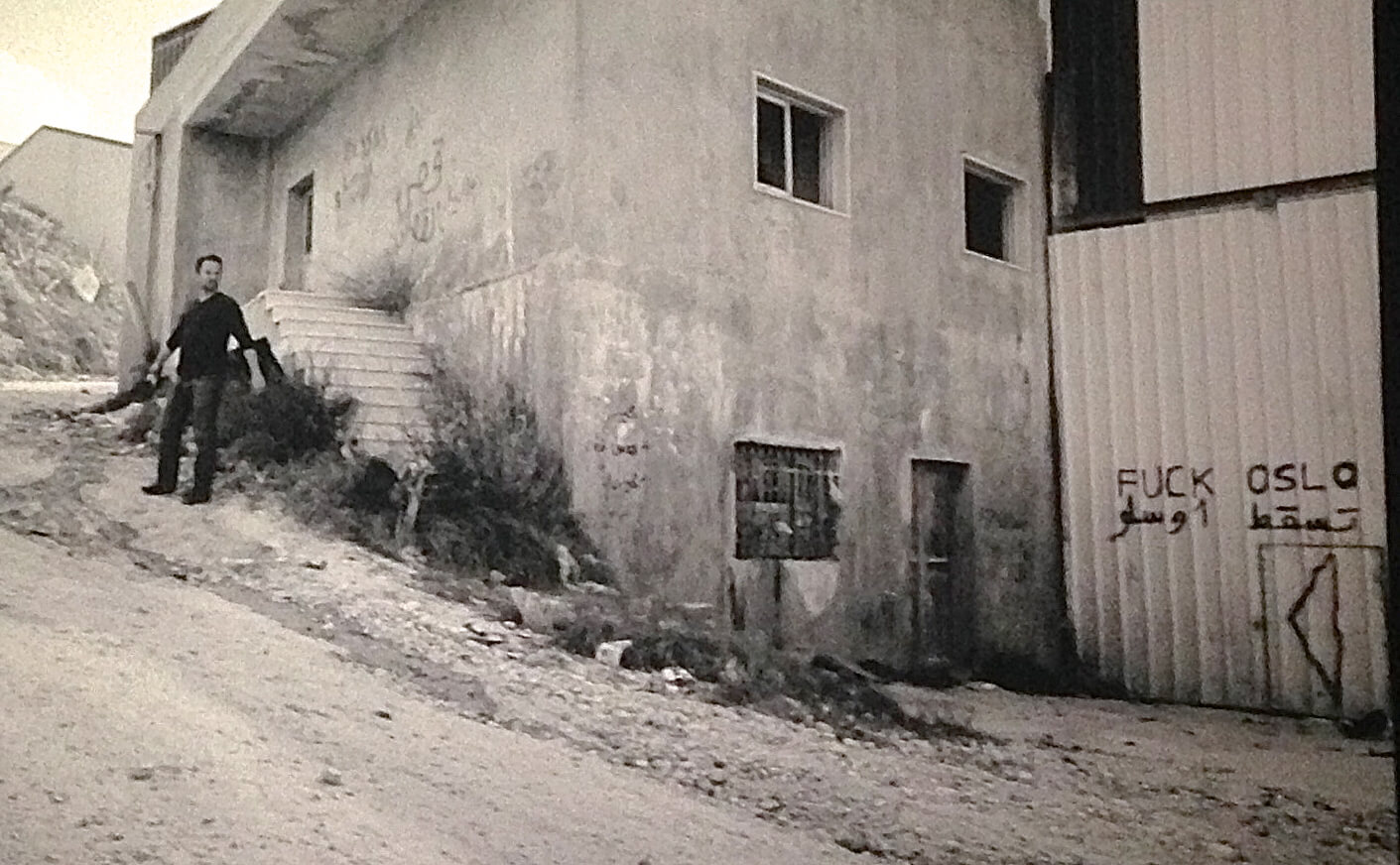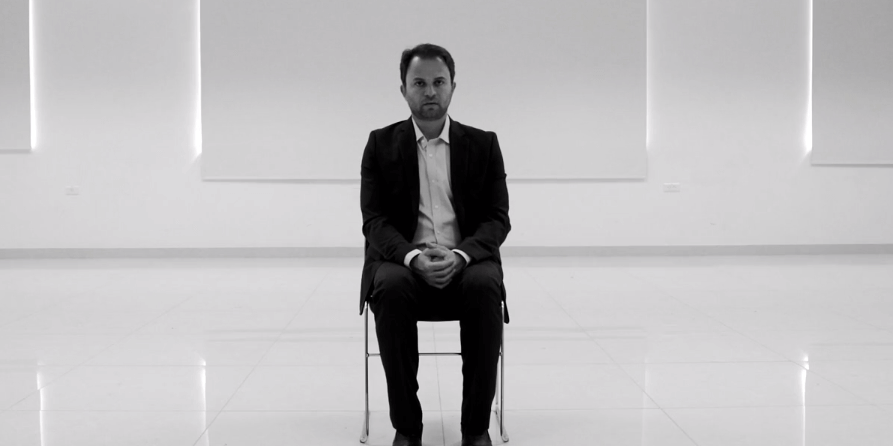More than twenty years have passed since the Oslo accords were signed and the Israeli-Palestinian conflict seems hopeless and more complex than ever. New ideas and perspectives in narrating the conflict can help understanding and changing the situation. Palestinian Muayad Alayan’s film Love, Theft and other Entanglements presents a fresh and innovative way to look at the reality of occupation in Palestine. The film was presented in Milan at cinema Beltrade on 27 February, Muayad and the Italian distributor Paolo Minuto attended. Here is what I have learned.
The film is Muayad’s first feature-length film. It was filmed in Jerusalem and the West Bank. The film tells the story of Mousa, a Palestinian man who is trying to run away from his troubled past – he grew up in a refugee camp – and from the oppressive life he is living under occupation. He tries to secure bribe money to persuade a football manager to put him in a football delegation of Israelis and Palestinians, set to compete in Italy. Mousa steals cars from West Jerusalem to sell them in Palestine to secure this money. But when the very last car he steals happens to hide Avi, a kidnapped Israeli soldier in the trunk, Mousa finds himself on the run from both Palestinian militias and Israeli intelligence.
The film was screened in the Panorama section of the 65th Berlin International Film Festival. PalCine, a collective of filmmakers based in the Jerusalem-Bethlehem area produced the film along with an entirely Palestinian cast and staff. The film’s director Muayad and his brother Rami Alayan co-founded PalCine productions in 2012.
Comedy and the awkward reality of conflict

After the projection I sat in the cafeteria of Cinema Beltrade with the other viewers, the Italian distributor and Muayad for an informal discussion. Muayad recounted the story’s conception: “It was the period of time the Israeli soldier was kidnapped and my brother Rami and I had this thought: what is the worst thing that can happen to someone who does not want to be involved in the conflict? We thought of a character that only wants to get away with his troubles but ends up being more and more involved in the conflict”.
“To tell this story we opted for the absurd-funny style” explained the director, whose beautiful black and white scenes take inspiration from Jim Jarmusch and Jean-Luc Godard. “Black and white draws the line between fiction and reality so that you have this feeling that if someone is shot, they are not really going to die. I think life in Palestine, because of the occupation, is so awkward at moments that you start laughing about your own misery. We wanted to create a story that is somehow unreal like a fairy tale. Not because the characters and their problems are not real, they are very real, but because we wanted to express a state of mind and a feeling that I myself go through everyday living under occupation. My generation, the post-Oslo generation, we are really exploring the dark comedy and sarcasm”.
Of Bitterness and laughter (and Occupation)

One of the most striking aspects of the film is that it conveys feelings of oppression and frustration without a trace of resentment. “I used to be very angry. I would argue and protest with the soldiers at checkpoints but then I realized this situation is something humiliating for them too. I can recognize a soldier who does not want to be where he is. Some people are doing the military service only because they have to”.
One dialogue in the film between Avi, the kidnapped soldier, and Mousa is particularly representative. Muayad noted it was inspired by real conversations heard at checkpoints.
Mousa: What is your role in the army?
Avi: Just a normal soldier, doing my service. I wanted to be in the military radio but they did not accept me.
M: Is there a military radio?
A: Of course.
M: What do they do?
A: It’s like a normal radio but for soldiers, you do interviews with soldiers, putting songs. Actually I think my test was very good, but they did not think the same.
M: Show me what you did in the test.
A: You wouldn’t understand it.
M: It’s ok. A: [In Hebrew] Good evening ladies and gentlemen [Avi sings]
M: [after having listened] This is why they did not bring tanks and planes to rescue you.
In the background stands the inescapable politics of the conflict in which Mousa gets more and more involved. “How many people are like Mousa, who do not want to know and just want to live?” a woman from the audience asked.
“Palestinians are all more politically involved than the average citizens of the world, but also they would not want to be in this situation,” Muayad explained. “They wish they had a choice of not dealing with politics. So there are a lot of people like Mousa, sadly”.
Shifting the focus from the politics in the fiction to the politics in reality, attendees asked Muayad about the recent escalations in Palestine-Israel, commonly referred to as the “knife intifada”. “Personally I am surprised”, answered Muayad: “I thought it would be 10 or 20 people but now we are looking at 120 people. Palestinians cannot explain the phenomenon”. Arguably the frustration of a post-Oslo stalemate and continuing repressive occupation on an entire generation of Palestinians has contributed to their expression of anger and frustration on the street. “You have the settlers and all you are told is there is nothing we can do. The youth don’t feel that there is a platform where they can express themselves. In 10 years any kind of political activism has been killed”.
The Universality of the Characters

The characters in the film represent a network that is very familiar to Palestinians in the occupied territories and is universal at the same time (from the Israeli intelligence to the wise father figure). In this scenario the character of Mousa embodies the friction between individualism and the common good, being expressed in the dialogue between Mousa and the Palestinian militia. The militants intend to release the kidnapped soldier in exchange of Palestinian prisoners held in Israeli prisons. Mousa accepts to hand him over only if the militants pay him 10 thousand dollars.
“There is a confrontation between the hero, the militant devoting his life to the cause, and the thief, considered a coward in the society. The individual too wants what is good for the collective but wants to survive as well. Mousa is saying: I am a unique person, I am not a hero,” explained Muayad. In this film nothing is absolute, not even heroes, and contradictions are more real than ideologies – Why do you want to free the prisoners? So they can see how we struggle to survive? Leave them in prison! Screams Mousa to the militants. The film shows a debate that is not only local, internal to the Palestinian society in Israel-Palestine but also universal.
Love and a “Palestinian happy ending”
In juxtaposition with the static scenario, the character of Mousa goes through an evolution and emancipation. In the ending scene, Mousa is in prison and sits with his visiting daughter and woman, while a jailer watches in the background. The anti-hero who was selfishly leaving his people behind is now in prison, with his family next to him. “I never considered any other ending, Mousa has got his woman and daughter back and has redeemed himself” said Muayad. He faced his responsibilities and in a way he is freed, but with restrictions and limitations: “This is as happy as you can go with a Palestinian story,” joked Muayad.
“Do you believe in peace?”
The film is in black and white but reflects a nuanced and complex view. “Do you believe in peace,” European diplomats ask Mousa, in deciding whether he is eligible to go to play football on a team of Israelis and Palestinians. He looks at them: “Of course…peace is very good”. In the white empty room characteristic of the scene, the EU diplomats’ questions sound funny and out of context.
The whole scene seems to question the rationale behind foreign interventions in the country imposing a eurocentric perspective on the conflict.
EU diplomat: The trip includes a visit to Auschwitz, is it a problem for you?
Mousa: Isn’t it Italy?
EU diplomat: Yes, but we first need to pass by Auschwitz.
“A lot of foreign aid missions and workers are present in Palestine” says Muayad. “A lot of them come with the best intentions but unfortunately many times they come with an agenda and a perspective of what they think needs to be done without fully understanding the history and the situation.”
“Do you believe in peace?” I asked Muayad when concluding our conversation. “I think peace should simply exist without the need of talking about it so much. I think peace is a huge word and has many layers: personal, popular and political. I think working towards justice, freedom, liberty, equality is better and will eventually bring peace” he says and concludes: “personally I’m happy if audiences follow and support Palestinian cinema literature music art. For the nature and quality of it”.
LOVE, THEFT and other ENTANGLEMENETS – a film by Muayad Alayan from Palcine Productions on Vimeo.



“I think working towards justice, freedom, liberty, equality is better and will eventually bring peace”
Well put.
I really want to see this movie.
Very interested in this film and I hope I will be able to see it. Some of the descriptions/dialogue/ideas spoken about in this article remind me of Elia Suleiman’s brilliant films (Chronicle of a Disappearance and Divine Intervention). I assume many here know these films. For anyone who posts here frequently, considers himself/herself a film freak, and hasn’t seen these films, definitely check ’em out. From the look of the trailer above, Suleiman’s films I’ve mentioned may be a bit more… let’s say absurdist/surreal/non-linear. So be ready for that. Thank you for the article Silvia :)